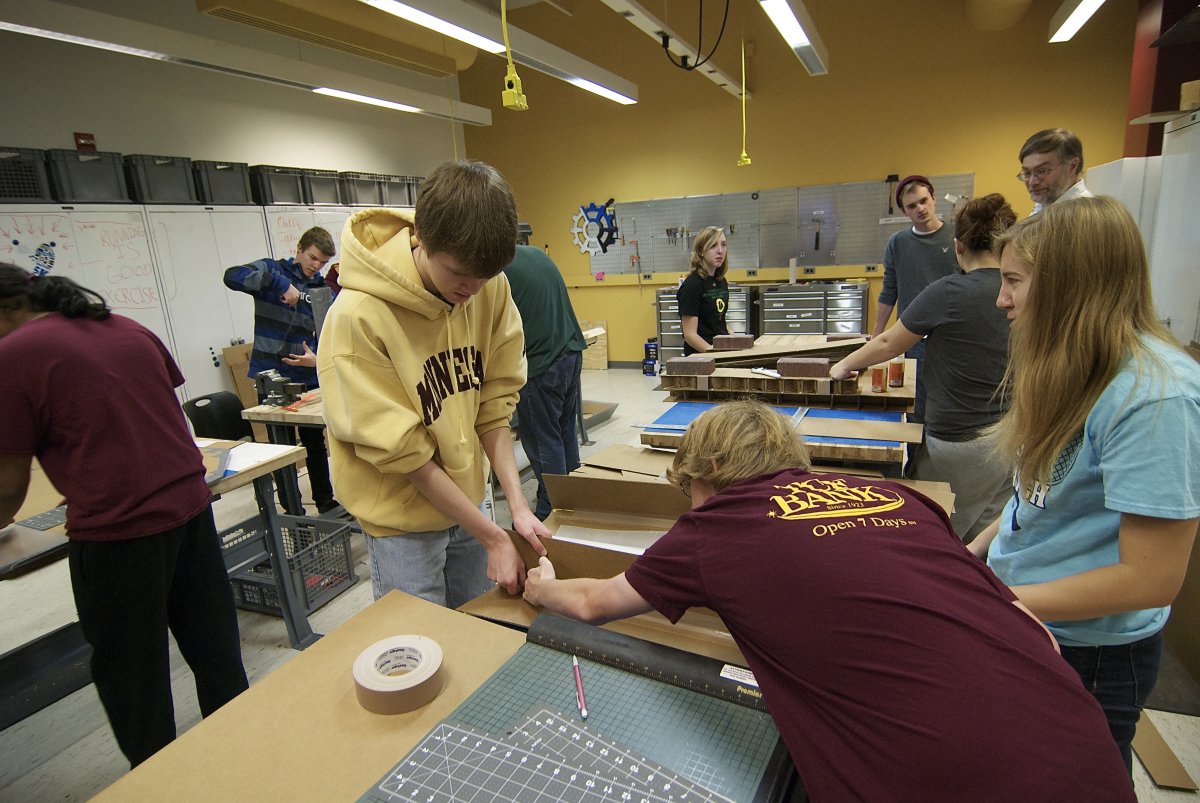Student Engagement Opportunities
Students in ECE engage in co-curricular and extra-curricular activities that help them strengthen their understanding of core concepts taught in class. These activities are opportunities for them to apply classroom learning to real world problems, and improve existing products and processes. The outcome of these activities can impact the lives of people locally and globally.
Here's a sampling of opportunities that students that dive into:
- Volunteer research opportunities with faculty
- Undergrad Research Opportunity Program
- Engineers Without Borders
- Tesla Works
- Solar Vehicle Project
- UMN Robotics
- IEEE
- Women in Engineering
Check out all the student groups CSE has to offer on the CSE Student Groups page.
CREATIVE SPACES
Our students also have access to resources such as the Anderson Student Innovation Lab and our very own Exceed Lab makerspace. Students can apply to the Envision Fund to pursue independent extra-curricular projects that have electrical or computer engineering content, receiving funding up to $500.
Many of our students also choose to study abroad through for-credit learning abroad programs, or apply their engineering skills to solve problems all over the world through our many socially engaged student groups.
ENGINEERING CO-OP PROGRAM
A co-operative undertaking between industry and the University of Minnesota, the Engineering Co-op Program provides students with hands on high quality engineering education to our students. While students build their knowledge and skills in the classroom and lab, engaging in engineering projects in the workplace enhances and enriches their education. The experience prepares students for successful engineering careers, and employers gain the opportunity to give back to the community by training a new crop of engineers.
The co-op program facilitates the recruitment of students to gain industrial experience during the last two years of their academic program. During this period, students complete two or three full-time industrial assignments alternating with regular academic semesters. Students typically earn $20,000 - $35,000 during their two or three semester work terms, while also earning credits toward their degree program. About half of the participating students receive a full time job offer from the co-op company upon graduation. Learn more about the Engineering Co-op Program.
CUSP CERTIFICATE
An ECE student can receive a “Documented Emphasis on the CUSP™ Curriculum” certification by taking selected classes in the power and energy technical area in their degree program. CUSP™ stands for the Consortium of Universities for Sustainable Power, and the certificate demonstrates interest and knowledge in the field of power and Energy. Supported by various agencies and organizations such as the NSF (National Science Foundation), ONR (Office of Naval Research), and others, the consortium comprises universities nationwide that support the CUSP™ curriculum. Completion of the certificate helps students demonstrate their expertise in sustainable power when applying for jobs. Learn more about the CUSP™ Curriculum and reach out to your undergraduate advisor on when and how to plan for the certificate.
LEARN ABROAD
ECE undergraduates have the opportunity to participate in study abroad programs for degree credit. Many students have successfully completed a semester abroad and transferred back engineering courses for their degree program. If you are interested in learning abroad, plan on working with your undergraduate advisor early in your degree program. The CSE Learn Abroad office can help you explore various study abroad programs including short-term programs and semester-long exchange programs.
SENIOR DESIGN PROJECT
Another venue to engage in such activity is the ECE senior design project. All ECE students in their senior year are required to work in teams on a real world project or problem. The goal is to develop and hone their problem solving skills, help students learn the design process and troubleshooting, and develop communication and interpersonal skills. Students are responsible not only for developing a working prototype of a device, or an improvement on an existing one, but to also provide written and oral reports. Completed as a course (EE 4951W), the semester long experience for students culminates in the senior design show held at the end of the semester where students showcase their projects to an audience of other engineering students, faculty, industry experts, and lay individuals.
